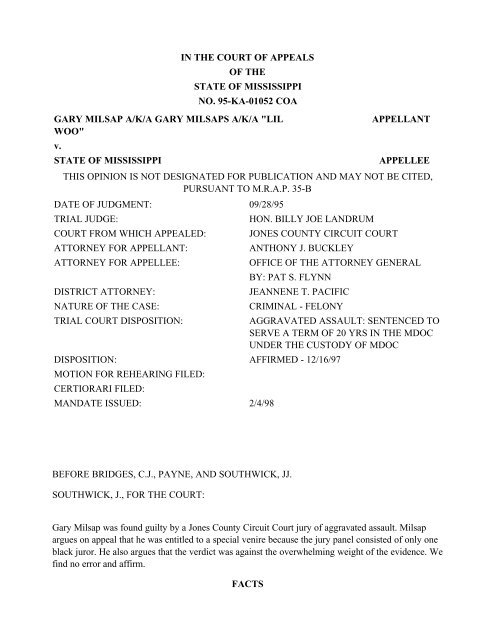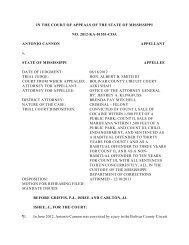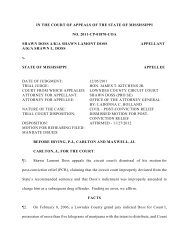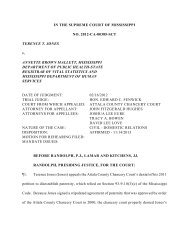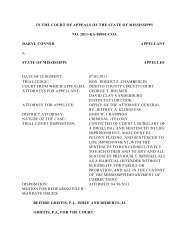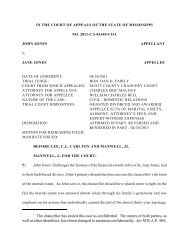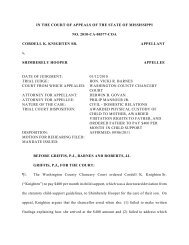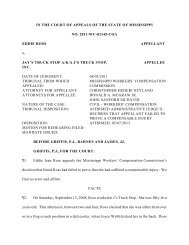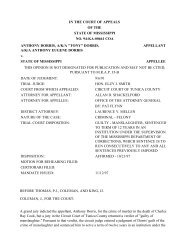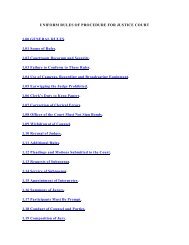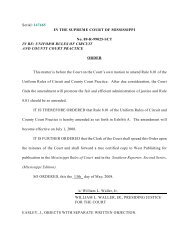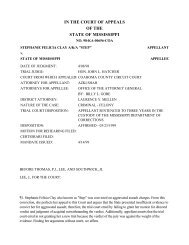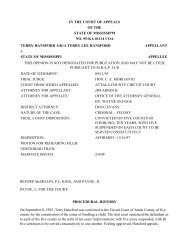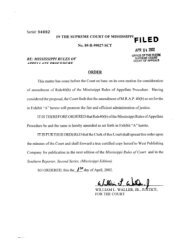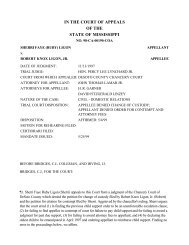95-KA-01052 COA - Mississippi Supreme Court
95-KA-01052 COA - Mississippi Supreme Court
95-KA-01052 COA - Mississippi Supreme Court
You also want an ePaper? Increase the reach of your titles
YUMPU automatically turns print PDFs into web optimized ePapers that Google loves.
IN THE COURT OF APPEALS<br />
OF THE<br />
STATE OF MISSISSIPPI<br />
NO. <strong>95</strong>-<strong>KA</strong>-<strong>01052</strong> <strong>COA</strong><br />
GARY MILSAP A/K/A GARY MILSAPS A/K/A "LIL<br />
WOO"<br />
v.<br />
APPELLANT<br />
STATE OF MISSISSIPPI APPELLEE<br />
THIS OPINION IS NOT DESIGNATED FOR PUBLICATION AND MAY NOT BE CITED,<br />
PURSUANT TO M.R.A.P. 35-B<br />
DATE OF JUDGMENT: 09/28/<strong>95</strong><br />
TRIAL JUDGE: HON. BILLY JOE LANDRUM<br />
COURT FROM WHICH APPEALED: JONES COUNTY CIRCUIT COURT<br />
ATTORNEY FOR APPELLANT: ANTHONY J. BUCKLEY<br />
ATTORNEY FOR APPELLEE: OFFICE OF THE ATTORNEY GENERAL<br />
BY: PAT S. FLYNN<br />
DISTRICT ATTORNEY: JEANNENE T. PACIFIC<br />
NATURE OF THE CASE: CRIMINAL - FELONY<br />
TRIAL COURT DISPOSITION: AGGRAVATED ASSAULT: SENTENCED TO<br />
SERVE A TERM OF 20 YRS IN THE MDOC<br />
UNDER THE CUSTODY OF MDOC<br />
DISPOSITION: AFFIRMED - 12/16/97<br />
MOTION FOR REHEARING FILED:<br />
CERTIORARI FILED:<br />
MANDATE ISSUED: 2/4/98<br />
BEFORE BRIDGES, C.J., PAYNE, AND SOUTHWICK, JJ.<br />
SOUTHWICK, J., FOR THE COURT:<br />
Gary Milsap was found guilty by a Jones County Circuit <strong>Court</strong> jury of aggravated assault. Milsap<br />
argues on appeal that he was entitled to a special venire because the jury panel consisted of only one<br />
black juror. He also argues that the verdict was against the overwhelming weight of the evidence. We<br />
find no error and affirm.<br />
FACTS
In the early morning of January 29, 19<strong>95</strong>, an argument occurred among some young males at the<br />
Kings Club Lounge in Laurel. Milsap and others verbally and physically confronted another group of<br />
youths, one of whom was named Tony Barnett. Vidal Brown, the victim, had not been involved in<br />
the argument but was wearing a shirt that was identical to the one worn by Tony Barnett.<br />
As a result of the confrontation Milsap and some of the others had been evicted from the lounge.<br />
Later some of those who had remained were warned not to leave the lounge, that Milsap and his<br />
friends were outside with a gun. As Vidal Brown opened the door and stepped outside to leave, he<br />
was shot in the head. Three witnesses inside the club and one standing outside positively identified<br />
Milsap as the gunman.<br />
Milsap was indicted by the grand jury and charged with aggravated assault. The trial lasted for two<br />
days. There was extensive testimony by the eyewitnesses, and discrepancies were thoroughly<br />
discussed during cross-examination. The case was submitted to the jury, which returned a verdict of<br />
guilty of aggravated assault.<br />
I. SPECIAL VENIRE<br />
DISCUSSION<br />
Milsap alleges that the trial court erred in not calling a special venire because the jury panel had only<br />
one black member and did not fairly represent the racial composition either of Jones County or the<br />
City of Laurel. After jury voir dire had been completed, Milsap challenged the composition of the<br />
jury panel on this basis. Milsap requested that additional jurors be summoned.<br />
Special venires are governed by statute. Miss. Code Ann. § 13-5-77 (Supp. 1997). A special venire<br />
is only allowed in cases where the accused is charged with a capital crime or manslaughter. Milsap<br />
was charged with aggravated assault and therefore has no right to a special venire.<br />
Regardless of the offense, Milsap also was not entitled to a special venire because he did not request<br />
one until the day of trial. Although there is no deadline specified in the statute, there are cases<br />
holding that a request for special venire must be made prior to trial. See Davis v. State, 684 So. 2d<br />
643, 650 (Miss. 1996).<br />
What, in fact, Milsap argues is that there was a lack of constitutionally required racial balance on the<br />
jury venire. In support of his contention, he cites Lanier v. State, 533 So. 2d 473 (Miss. 1988). In<br />
Lanier, the supreme court described the elements of a prima facie violation of the fair-cross-section<br />
requirement enunciated in Duren v. Missouri, 439 U.S. 357, 364 (1979):<br />
(1) that the group alleged to be excluded is a "distinctive" group in the community; (2) that the<br />
representation of this group in venires from which juries are selected is not fair and reasonable<br />
in relation to the number of such persons in the community; and (3) that this under<br />
representation is due to systematic exclusion of the group in the jury-selection process.<br />
Lanier, 533 So. 2d at 477.<br />
Milsap failed to offer proof of any of the required elements at trial. He makes no claim of purposeful<br />
discrimination in the selection of the venire. In short, he failed to meet the burden required to
establish a prima facie violation of the fair-cross-section requirement.<br />
II. OVERWHELMING WEIGHT OF THE EVIDENCE<br />
Milsap claims that he deserved a new trial because the verdict was against the overwhelming weight<br />
of the evidence. A new trial should be granted only if the trial judge is convinced that the verdict is so<br />
contrary to the weight of the evidence that failure to grant a new trial would result in an<br />
unconscionable injustice. May v. State, 460 So. 2d 778, 781 (Miss. 1984). In determining whether a<br />
verdict is against the overwhelming weight of the evidence, this <strong>Court</strong> is required to view all of the<br />
evidence at trial in the light consistent with the jury verdict and we will not substitute our own view<br />
of the evidence for that of the jury. Blanks v. State, 542 So. 2d 222, 226 (Miss. 1989).<br />
There were some variances in the eyewitness testimony. However, four witnesses testified that they<br />
saw Milsap shoot Brown. The vantage point of each witness was somewhat in dispute. Milsap did<br />
not testify, nor did he call any witnesses to testify on his behalf. He argues that the eyewitness<br />
testimony was conflicting and inconsistent with statements given to the police at the scene. The<br />
weight to be given evidence and determining the credibility of the witnesses is within a wide range of<br />
discretion and solely the jury's function. Miller v. State, 634 So.2d 127, 130 (Miss. 1994).<br />
The trial judge did not abuse his discretion in denying the motion for a new trial.<br />
THE JUDGMENT OF THE CIRCUIT COURT OF JONES COUNTY OF CONVICTION OF<br />
AGGRAVATED ASSAULT AND SENTENCE TO TWENTY YEARS IN THE CUSTODY OF<br />
THE MISSISSIPPI DEPARTMENT OF CORRECTIONS IS AFFIRMED. ALL COSTS OF<br />
THIS APPEAL ARE ASSESSED AGAINST JONES COUNTY.<br />
BRIDGES, C.J., McMILLIN AND THOMAS, P.JJ., COLEMAN, DIAZ, HERRING,<br />
HINKEBEIN, KING, AND PAYNE, JJ., CONCUR.


